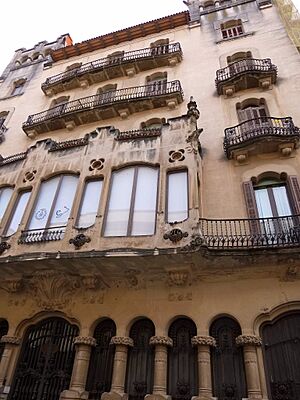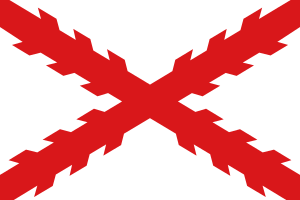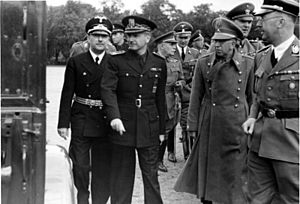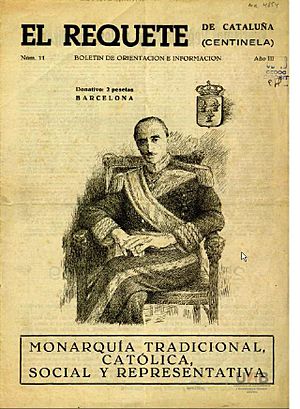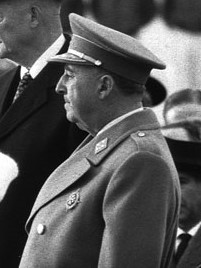Joaquín Bau Nolla facts for kids
Quick facts for kids
Joaquín Bau Nolla
|
|
|---|---|
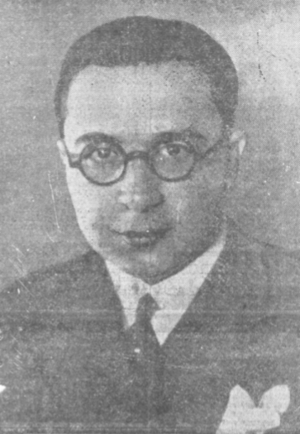 |
|
| Born |
Joaquín Bau Nolla
1897 Tortosa, Spain
|
| Died | 1973 Madrid, Spain
|
| Nationality | Spanish |
| Occupation | lawyer, politician |
| Known for | Politician |
| Political party | Unión Patriótica, CT, FET |
Joaquín Bau Nolla (1897–1973) was an important Spanish politician. He was part of the Carlist movement and later supported Franco's government.
Contents
Early Life and Family
Joaquín Bau Nolla was born in 1897 into a well-off family in Catalonia, Spain. His family lived in Tortosa. His grandfather, Miguel Bau Isern, owned a chocolate factory. He was also the mayor of Tortosa from 1901 to 1903. He helped start several local businesses.
Joaquín's father, José Bau Vergés, was a very successful oil and vinegar producer. People called him "el rei de l'oli," which means "the king of oil." His company, Aceites Bau S.A., sold products all over Spain and even exported to South America. The family built a large home in Tortosa.
Joaquín was the second of four children. He went to school in Tortosa and later in Barcelona. After school, he completed his military service in 1921. He also became a commercial broker, helping people buy and sell goods. By 1935, he was the president of the main group for commercial brokers in Spain. In 1933, he started studying law and finished his degree in 1935.
In 1920, Joaquín Bau married Pilar Elisa Carpi Esteller. They had five children. Their oldest son, Joaquín, joined a Carlist youth group called the requeté when he was 16. He later became an engineer. Another son, Fernando, became a lawyer and a politician.
Becoming Mayor of Tortosa
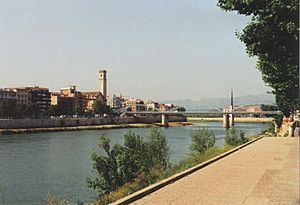
Joaquín Bau followed in his family's footsteps, becoming involved in politics. He joined the Traditionalist movement, which supported old Spanish traditions and a specific type of monarchy. As a young man, he led the local branch of the Requeté, a youth group for Carlists. He was very active in social work, helping the poor and setting up Catholic worker groups.
In 1924, when Miguel Primo de Rivera became the leader of Spain and started a dictatorship, Bau joined his new political party, Unión Patriótica. He quickly became the leader of this party in his province.
In 1925, Joaquín Bau was chosen to be the mayor of Tortosa. He was re-elected in 1928 and served until 1930. This time was known as "Bauisme" in Tortosa's history. As mayor, he worked hard to improve the city. He modernized streets, fixed up schools and hospitals, and started a regular fire brigade. He also opened new schools and improved the local railway and roads.
A big part of his work was dealing with issues related to the Ebro river, like floods and improving navigation. He was a very young mayor and was praised by the king, Alfonso XIII. However, he was not able to make Tortosa a provincial capital, which was one of his goals.
Even though the Carlists initially supported Primo de Rivera, their leader later opposed the dictatorship. Bau, however, continued to support the government. In 1927, he was appointed to a special assembly called the Asamblea Nacional Consultiva, which was like a parliament. He was one of its youngest members. He kept supporting the dictator and organized events in Tortosa and Madrid.
A Member of Parliament
Bau stopped being mayor of Tortosa in 1930. In 1932, he rejoined the main Carlist organization, Comunión Tradicionalista. He led the local Requeté group in Tortosa.
In the 1933 elections, he was elected as a member of the Spanish parliament, representing the Carlists. This made him an important Carlist leader in the eastern part of Spain.
Bau supported the idea of Catalonia having its own identity, but he disagreed with the self-government laws passed at the time. He believed they went against Spain's best interests. He wanted new laws that truly reflected Catalonia's unique character. He also supported Christian worker groups in his province. In October 1934, he helped organize local efforts against a revolutionary uprising.
Some Carlists were suspicious of Bau. This was because he was friendly with José Calvo Sotelo, a leader of another monarchist group. Some thought Bau wanted to unite the Carlist movement with the other monarchist group, even though the Carlist leader, Manuel Fal Conde, did not agree. Despite these concerns, Bau was allowed to speak at large Carlist meetings and was appointed to the Carlist Council of Economy.
Before the 1936 elections, Bau wanted a broad alliance of right-wing parties, but this did not happen. He was re-elected to parliament from Tarragona. After the left-wing Popular Front won the elections, Bau and Calvo Sotelo visited the prime minister, urging him to use the military to restore order. This was a very tense moment in his career.
During the Spanish Civil War
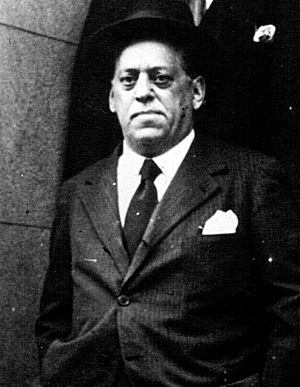
Before the Civil War began in July 1936, Bau was involved in secret plans against the government. He was a link between the Carlists and another right-wing group. After José Calvo Sotelo was killed, Bau traveled to Portugal to meet with General José Sanjurjo to discuss the planned uprising. He was there when Sanjurjo's plane crashed, killing the general.
Bau was supposed to give orders to Carlist youth groups in southern Catalonia. His absence affected the uprising plans in that area. Soon after the war started, he returned to the Nationalist zone in Burgos.
In September 1936, the Nationalist government created a special committee for industry and trade. Francisco Franco, the leader of the Nationalists, saw Bau as a Carlist who was willing to cooperate. Bau was appointed as one of its seven members. A month later, he became the president of the Committee for Industry, Trade, and Supplies, making him the de facto minister of economy for the Nationalists. He quickly became a top leader in the Nationalist government.
Bau's main job was to keep factories running and build up the Nationalists' gold reserves. He helped with currency reform, first by stamping old money and then by arranging for new Spanish money to be printed in Germany. He also worked to control foreign trade and make sure important supplies were available. He was involved in deals to get cars and truck parts for the Nationalist army.
His relationship with the Carlist movement became complicated. Some sources say he helped get weapons for the Carlist youth groups. Others say he helped organize a Carlist battalion made up of refugees from Catalonia. However, he did not protest when Franco took action against the Carlist leader, Manuel Fal. It seems he accepted Franco's plan to unite all right-wing groups under one party. Because of this, he was later removed from the Carlist movement by its leader, Don Javier.
Later Years and Influence
Bau's influence began to decrease when Ramón Serrano Suñer, Franco's brother-in-law, became more powerful. Serrano Suñer did not like Bau. By early 1938, when Franco formed his first regular government, Bau was not included. In the spring of 1938, he left Burgos and moved to San Sebastián.
In San Sebastián, Bau worked with other Catalan business leaders to plan how to rebuild the economy in Catalonia once the Nationalists took control. He was offered the presidency of a regional agricultural organization but turned it down due to his bad relationship with Serrano Suñer. Some documents from the time even called him a leader of "rich businessmen" who were against the new government's ideas.
Bau continued to support the Catalan Carlist battalion and was involved in many charity projects. He also helped Catalan Republican prisoners of war. He used his connections to help release Catalan prisoners and get them into either Carlist or Falangist groups. After the war ended, he returned to Tortosa.
Bau was not invited to the victory parade in 1939. Even though he was no longer in national politics, he was involved in secret business deals for Franco's government. In the early 1940s, he managed a deal to build 20 wooden ships to supply German troops in Africa during World War II. Later, he focused on his family, Catholic organizations, and business. He became the first president of Banco de Tortosa after the war and grew his wealth through banking and his family's oil business. He also enjoyed organ music.
Bau was part of a group of Carlists who wanted to work with the Alfonsist claimant, Don Juan, who was another potential king. He believed that a future kingdom should include parts of Franco's system. By the mid-1950s, he seemed to support Franco's plan to crown Prince Juan Carlos as the future king. In 1957, he officially declared Don Juan as the rightful heir.
A High-Ranking Official in Franco's Government
In the mid-1950s, Franco changed his approach to governing and started looking for loyal people who were not closely linked to the Falangist party. In 1958, Franco appointed Bau as a member of the National Council of the Movement, which automatically made him a member of the Spanish parliament, the Cortes Españolas. He kept his seat in parliament for five more terms.
As his career restarted, Bau took on higher and higher positions. In 1963, he began leading various parliamentary committees. He became president of the internal affairs committee in 1964 and president of the committee for new constitutional laws in 1965. In 1965, he was appointed president of the Council of State, an important advisory body in Franco's government. This appointment also led to his nomination to the Council of the Realm, another body related to the monarchy. In 1970, he became its vice-president. By the late 1960s, Bau was one of the most recognizable figures in Franco's government. Shortly before his death, he was given the title of Count of Bau.
Bau's rise was possible because he was acceptable to most of the different groups within Franco's government. He didn't have his own strong political group, so he wasn't seen as a threat. Carlists, monarchists, business people, the Church, and even the military saw him as sympathetic to their causes. He was known for his elegant style, excellent speaking skills, and ability to manage conflicts fairly, while always remaining loyal to Franco.
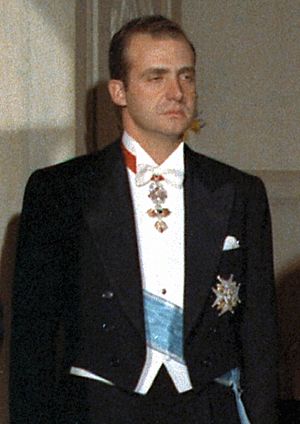
Bau believed in a strong, non-dynastic monarchy based on Catholicism. After returning to politics in 1958, he became a leading monarchist. He helped shape the later laws of Franco's system, especially those related to the monarchy. He worked to get laws passed that would confirm Juan Carlos as Franco's successor. His efforts were successful when Juan Carlos was officially named Franco's successor in 1969. Bau continued to advise Juan Carlos in the early 1970s. He also kept his Catalan identity, participating in regional groups as allowed by the government.
Legacy
Joaquín Bau is remembered with a short street in Madrid and a plaza in Tortosa (until 2017). His family also owns a summer home in Benicàssim, where a long driveway is named after him. Some of these names have been debated because of his connection to Franco's government.
From 1956 to 2018, a college in Tortosa was named "Institut Joaquín Bau," but it is now called Institut Dertosa. A book about Bau's life was published in 2001. It described him as a conservative monarchist and focused less on his Carlist past or controversial parts of his life. The title of Count of Bau is still used by his grandson today.
See also
 In Spanish: Joaquín Bau para niños
In Spanish: Joaquín Bau para niños
 | Anna J. Cooper |
 | Mary McLeod Bethune |
 | Lillie Mae Bradford |


